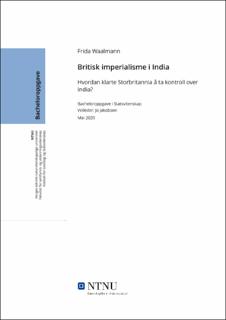| dc.contributor.advisor | Jakobsen, Jo | |
| dc.contributor.author | Waalmann, Frida | |
| dc.date.accessioned | 2020-07-07T16:03:44Z | |
| dc.date.available | 2020-07-07T16:03:44Z | |
| dc.date.issued | 2020 | |
| dc.identifier.uri | https://hdl.handle.net/11250/2661117 | |
| dc.description.abstract | Hensikten med denne oppgaven er å gi innsikt i hvordan britisk imperialisme la et grunnlag for at Storbritannia fikk kontroll over det indiske subkontinentet, og forskningsspørsmålet lyder slik «Hvordan klarte Storbritannia å ta kontroll over India?»
Konklusjonen synes å være at det er fire årsaker til at Storbritannia klarte å ta kontroll over India. I etterkant av Det indiske opprøret av 1857 fikk Storbritannia kontroll over India, i stedet for at det fortsatt var East India Company som hadde kontrollen. Videre var oppløsningen av avstand mellom Storbritannia og India gjennom ny teknologi og nye transportsystemer som jernbanen og dampskipet avgjørende for at Storbritannia fikk en større maktposisjon i India. I tillegg var det avgjørende for det britiske styret at en privilegert indisk elite kunne videreformidle ordre til innfødte indere. Den siste avgjørende årsaken for at Storbritannia fikk kontroll over det indiske subkontinentet var gjennom «splitt-og-hersk» prinsippet der den britiske kolonimakten eksplisitt forhindret etniske folkegrupper fra å samhandle for å unngå et nytt opprør og økt misnøye. | |
| dc.description.abstract | The purpose of this thesis is to provide insight into how British imperialism laid a foundation for Britain to gain control of the Indian subcontinent, and the research question is "How did Britain manage to take control of India?"
The conclusion seems to be that there are four reasons why Great Britain managed to take control of India. Following the Indian Rebellion of 1857, Great Britain gained control over India, rather than the East India Company still being in control. Furthermore, the annihilation of distance between Great Britain and India through new technology and new transportation systems, such as the railway and steamship was crucial to Great Britain gaining a greater position of power in India. In addition to this, it was crucial for the British government that a privileged Indian elite could pass on orders to native Indians. The last decisive reason for why Britain gained control of the Indian subcontinent was through the “divide-and-rule” principle where the British colonial power explicitly prevented ethnic groups from interacting to avoid a new uprising and increased dissatisfaction. | |
| dc.publisher | NTNU | |
| dc.title | Britisk imperialisme i India | |
| dc.type | Bachelor thesis | |
